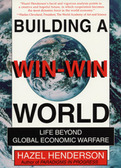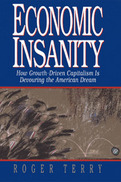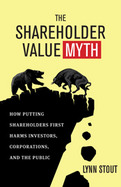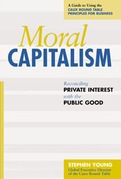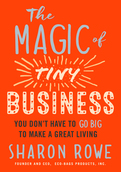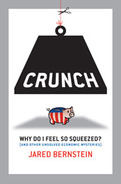Building a Win-Win World demonstrates how the global economy is unsustainable because of its negative effects on employees, families, communities, and the ecosystem. Henderson shows that win-win strategies can become the norm at every level when people see the true current and future costs of short-sighted, narrow economic policies.
Henderson shows how humans are encountering the endgames of the competition/conflict paradigm, and identifies the signs of transition. Using warfare as a metaphor for the dark side of today's world economic system, she shows how both are destructive, inhumane, wasteful, irrational, inefficient, competitive, and crisis-driven. Both create more new problems than they solve. She describes how the globalization of the war system, technology, and industrialization brought the Cold War to a dead end. By the mid-1980s the global warfare paradigm had given ground to a global economic warfare which many economists, politicians, and business leaders hailed as a victory of capitalism and competitive "free markets." Yet this new type of warfare proved little better than the military warfare it was advertised to replace. By the mid-1990s global economic warfare had already reached crisis points of its own.
Building a Win-Win World examines how jobs, education, health care, human rights, democratic participation, socially responsible business, and environmental protection are all sacrificed to "global competitiveness." Henderson shows many ways out of the dilemmas faced by all countries. New agreements are described to tame the global economic casino, regulate multi-national corporations, and levy fees for commercial use of global common resources-oceans, atmosphere, space, etc.-and tax their abuse. These revenues can then be invested in civilian needs and sectors worldwide. She also describes a trend toward "grassroots globalism"-citizens movements that are addressing poverty, social inequities, pollution, resource-depletion, violence, and wars. Grassroots globalism, she says, is about thinking and acting-globally and locally. It is pragmatic problem-solving, implementing local solutions that keep the planet in mind. Such social innovations can raise the ethical floor under the global playing field so that the most ethical companies and countries can win.
- Explores current economic trends in search of ways to accelerate human development that are sustainable within the earth's ecosystems
- Examines how social innovations are finding expression in new forms of enterprise, new institutions, partnerships, and cooperative agreements that can lead to the building of a win-win world
- Offers positive approaches for concerned citizens who accept that personal development and rights bring a greater responsibility for the human family
1995
"Economic insanity" describes what is happening in America and the wider world beyond its borders. The economy is out of control-out of our control-to the point that it is in control. The economy has divorced itself from the political and social ideals that define the American Dream, which has been transformed from an all-inclusive social ideal to an economic fantasy.
In Economic Insanity, Roger Terry explains how and why economics has come to dominate all aspects of our lives. Basic political, social, and moral values used to hold us together as a nation. Today, it seems, the economy is all that holds us together. The most drastic effects of the rise of Economic America are the impoverishing of democracy, the loss of liberty, and the abandonment of equality. Terry shows how our present system is failing at its most fundamental task-to provide for the physical needs and wants of human beings-and concludes that the system does not need fixing, it needs to be replaced.
This provocative proposal exposes the misconceptions that drive our economic system and offers systemic and revolutionary solutions. With passion and persuasiveness, Terry asserts that in order to recapture the American Dream, we must begin to subject the economy to the ideals of democracy, liberty, equality, and unity.
Terry questions, and suggests we abandon, four fundamental pillars of capitalism: endless economic growth, ever-increasing productivity, accelerating technological advances, and self-interest. He shows how these basic assumptions that drive our version of the free-market system are causing a host of interrelated and deeply entrenched problems. He explores critical social dilemmas that result from our current economic assumptions, including the loss of personal freedom and democracy, the perpetual and unavoidable increase in inequality, and the disuniting of America. If we are to turn our nation from this path of folly, Terry argues, we must first abandon the faulty assumptions that drive our thinking.
Terry proposes a solution that redefines the notion of capital ownership, creating a system of limited, widespread ownership in which individuals own only as much capital as they can make personal productive use of. Under this system, employees become owner/partners, power is returned to people, self-interest is defused, technology is harnessed, and meaningful equality is encouraged.
Incorporating ideas from Adam Smith and Thomas Paine to Paul Johnson and Herman Daly, Economic Insanity challenges readers to stop looking for answers within the system and look instead to changing the system.
- Shows America's economic system to be at odds with its social and political goals and proposes a system designed to increase personal freedom
- Questions the most basic assumptions that drive our economic system, and argues that its entire structure must be challenged
—Jack Welch
Executives, investors, and the business press routinely chant the mantra that corporations are required to “maximize shareholder value.” In this pathbreaking book, renowned corporate expert Lynn Stout debunks the myth that corporate law mandates shareholder primacy. Stout shows how shareholder value thinking endangers not only investors but the rest of us as well, leading managers to focus myopically on short-term earnings; discouraging investment and innovation; harming employees, customers, and communities; and causing companies to indulge in reckless, sociopathic, and irresponsible behaviors. And she looks at new models of corporate purpose that better serve the needs of investors, corporations, and society.
2003
- Shows how to ensure that capitalism promotes progress and equality rather than enriching the few at the expense of many
- Based on principles developed by the Caux Round Table, an international network of senior business executives from such companies as 3M, Canon, NEC, Bankers Trust, Shell, Prudential, and dozens of other companies
- Provides practical guidelines for corporate social responsibility through the Caux Round Table's Seven General Principles for Business
The world is drifting without a clear plan for its economic development. Communism is dead, but in the wake of Enron and similar scandals, many see capitalism as amoral and too easily abused. A blueprint for progress is needed and Moral Capitalism provides one.
Moral Capitalism is based on principles developed by the Caux Round Table, an extraordinary international network of top business executives who believe that business can-and must-weigh both profit and principle. Caux Round Table's global chair, Stephen Young, argues that the ethical standards inherent in capitalism have been compromised by cultural values inimical to capitalism's essentially egalitarian, rational spirit, and distorted by the short-sighted dog-eat-dog doctrines of social Darwinism into what he calls brute capitalism. He demonstrates how the Caux Round Table's Seven General Principles for Business can serve as a blueprint for a new moral capitalism, and explores in detail how, if guided by these principles, capitalism is really the only system with the potential to reduce global poverty and tyranny and address the needs and aspirations of individuals, societies, and nations.
- Shows how to ensure that capitalism promotes progress and equality rather than enriching the few at the expense of many
- Based on principles developed by the Caux Round Table, an international network of senior business executives from such companies as 3M, Canon, NEC, Bankers Trust, Shell, Prudential, and dozens of other companies
- Provides practical guidelines for corporate social responsibility through the Caux Round Table's Seven General Principles for Business
—Seth Godin, author of Linchpin
Too many of us feel trapped by work that keeps us from living our purpose. We fantasize about starting our own business, yet we're warned against falling into debt, working eighty hours a week, and coping with the pressure to grow. Eco-Bags Products founder Sharon Rowe says there's another way: go tiny.
Like a tiny house, a tiny business is built on maintaining a laser focus on what is essential by living an intentional life. As an entrepreneur and mother, Rowe is most concerned with putting family first, maintaining financial security, and doing something that makes an impact in the world. Using the success story of Eco-Bags Products, Rowe distills the step-by-step process of building a profitable, right-scaled, sustainable venture that doesn't compromise your values. She shows you how to test your concept, manage your money and priorities, and more, while staying true to the "tiny" ethos.
2008
Is Social Security really going bust, and what does that mean to me? If I hire an immigrant, am I hurting a native-born worker? Why does the stock market go up when employment declines? Should I give that homeless guy a buck? What’s a “living wage”? How much can presidents really affect economic outcomes? What does the Federal Reserve Bank really do? And even when some pundits say the economy’s sound, why do I still feel so squeezed?
If you’d like some straight answers, premier economist Jared Bernstein is here to help. In Crunch he responds to dozens of questions he has fielded from working Americans, questions that directly relate to the bottom-line, dollars-and-cents concerns of real people. Chances are if there’s a stumper you’ve always wanted to ask an economist, it’s solved in this book.
Bernstein is fed up with “Darth Vaders with PhDs” who use their supposed expertise to intimidate average citizens and turn economics into a tool for the rich and powerful. In the pages of Crunch, Bernstein lays bare the dark secret of economics: it’s not an objective scientific discipline. It’s a set of decisions about the best way to organize our society to produce and distribute resources and opportunities. And we all can, and must, participate in these decisions. “America is a democracy,” he writes. “And in a democracy all of us, not just the elites and their scholarly shock troops, get to weigh in on biggies like this.”
To not weigh in, Bernstein insists, is a profoundly political act, one with damaging consequences. Our economy will be only as fair as we can make it. In this lively and irreverent tour through everyday economic mysteries, Bernstein helps us decode economic “analysis,” navigate through murky ethical quandaries, and make sound economicdecisions that reflect our deepest aspirations for ourselves, our families, and our country.


